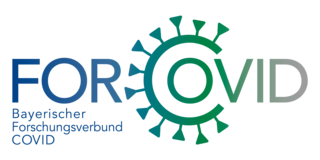FOR-COVID
Bavarian consortium for research on the pandemic disease COVID-19 (FOR-COVID)

Mucosal immune responses for protection against SARS-CoV-2
Projectleaders
Prof. Dr. Matthias Tenbusch
Prof. Dr. med. Klaus Überla
Due to the short incubation period of respiratory viral infections including the SARS-CoV-2, vaccines need to induce immune responses leading to an immediate antiviral response upon exposure. Secretory IgA and tissue-resident memory T cells (TRM) at the mucosal surface have been identified as major players involved in the protection against pulmonary virus infections.
Therefore, the project aims to induce protective mucosal immune responses by systemic prime - mucosal boost immunization regimens in mice and to explore mechanisms of protection against SARS-CoV-2. In light of newly emerging variants of concern, the longevity and the breadth of vaccine-induced protection will be most relevant to decipher. So far, vaccines based on messenger RNA (mRNA) or adenoviral vectors (Ad) demonstrated efficacy against SARS-CoV-2 infections and, most importantly, against severe coronavirus disease 2019 (COVID-19) and death. However, breakthrough infections of fully vaccinated individuals have been reported and the numbers might increase due to immune escape by the variants or to waning immunity in the population. In case of breakthrough infection with the current delta variant, viral loads in the respiratory tract are comparable to those in non-vaccinated, infected patients. In our project, we want to provide evidence that mucosal booster immunizations lead to a higher degree of protection against the VOC and a more rapid control of local viral replication in case of breakthrough infections. Here, we will use systemic RNA or DNA prime immunizations followed by intranasal adenoviral vector immunizations which have been successfully evaluated for immunogenicity and efficacy in the first year of funding. Moreover, comparative studies with promising vaccine candidates developed by other members of this consortium will lead to an optimization of our mucosal vaccine regimen.
A second objective of our study is to address the questions how breakthrough infections in vaccinated individuals act as natural booster immunization and how this shapes the mucosal immune response in comparison to mucosal boost immunizations. The results from this study will be highly informative for the ongoing discussions if additional boost immunizations are mandatory for all or if natural infections in vaccinated individuals are even beneficial to achieve long-lived immunity. In the field of respiratory viruses, this debate is ongoing for a long time, but research addressing this point systematically is scarce. Therefore, our project will provide evidence for efficient mucosal vaccination approaches and generate insights in the role of natural infections in establishing persistent protective mucosal immunity against SARS-CoV-2. The results might be also transferable for the future management of newly emerging respiratory tract viruses.
Project partners:
- Friedrich-Alexander-Universität Erlangen-Nürnberg (FAU Erlangen-Nürnberg)



